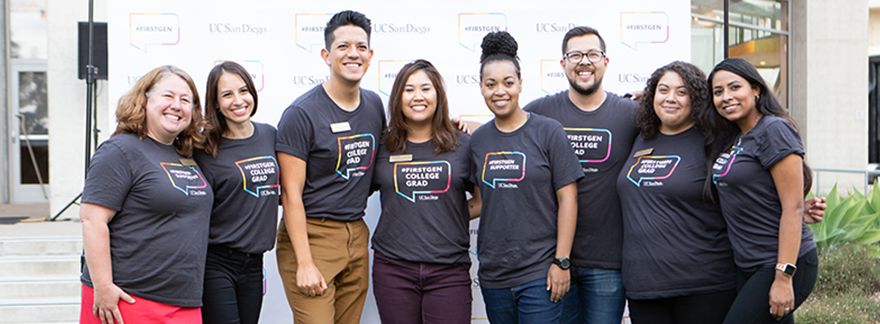Support for Student Populations
- First-Generation Students
- Military-Connected Students
- Transfer Students
- Undocumented Students

Learn about first-generation college students at UC San Diego, and how best to support them.
UC San Diego defines first-generation college students as students with neither parent having a four-year college degree (UCOP definition).
Student Retention and Success Units support first-generation college students through evidence-based support initiatives and programs that are proven to assist students with accessing resources, developing college capital skills and navigating their college journey.
A 2001 NCES study (Choy, 2001, p. xviii) found that while 82 percent of non-first-generation students enrolled in college immediately after finishing high school, only 54 percent of students whose parents had completed high school did, and only 36 percent of students whose parents had less than a high school diploma did.
Historically, first-generation college students — students whose parents have not attended college and/or have not earned a degree (Engle, Bermeo, & O’Brien, 2006) — are more likely to have lower college retention rates and were less likely to complete their academic programs in a timely manner (Pascarella, Pierson, Wolniak, & Terenzini, 2004). Additionally, research results reveal that only 26% of first-generation college students will earn a bachelor’s degree whereas their non-first generation peers earn a degree at a rate of 68% (Engle et al., 2006).
Source: UC First Generation Student Success at the University of California
Higher education researchers Vincent Tinto and Jennifer Engle provided the following recommendations for improving first-generation college student access and success:
Strategies that have been shown to help include:
These strategies are crucial components of many Student Retention and Success Units, demonstrating the institutional commitment that UC San Diego has for first-generation college students.
In accordance with applicable Federal and State law and University policy, the University of California does not discriminate, or grant preferences, on the basis of race, color, national origin, religion, sex, disability, and/or other protected categories.
More information about Proposition 209 can be found here.
More information about the University of California Anti-Discrimination Policy can be found here.